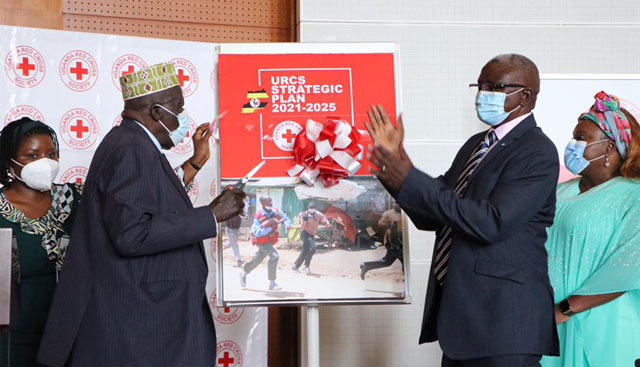
Kampala, Uganda | Isaac Khisa | The national society will focus on financial and institutional sustainability, system coordination and service delivery
Leading humanitarian organization, Uganda Red Cross Society, has unveiled a new five-year strategic plan 2021-2025 with key focus on financial and institutional sustainability, system coordination and service delivery.
The plan is expected to cost Shs235bn during implementation, translating into an annual estimated average of Shs47bn.
This new plan follows the completion of the implementation of a four-year strategic plan (2017-2020) code named ‘recovery plan,’ from a governance and leadership crisis that hit the national society around 2013-2014.
Robert Kwesiga, the Secretary General of Uganda Red Cross Society said during the new strategy launch in Kampala on April.29 that with the new systems in place, new leadership, a great team of advisors, and development partners, Red Cross is fully recovered to deliver on its mandate and do business with all stakeholders in delivering quality humanitarian services.
“We have strong internal systems and capabilities, have revitalized the volunteer base, branch network and functionality, governance and management structures enabled, and now the Red Cross is up to scale programming to build resilient communities that can mitigate and respond to disaster and emergences affecting them,” he said.
This enabled URCS to register an increase in resources mobilized from Shs 26.6bn in 2017 to Shs 70bn in 2020.
Dr. Halid Kirunda, Chairman Central Governing Board at URCS said the Board is interested in supporting management to raise more resources for the successful implementation of the strategy.
“Our desire is to see branch development and growth, governance structures at branch levels strengthened, management processes and capabilities enabled and resources raised to respond to the needs of people through the Red Cross core services as per the Red Cross mandate,” he said.
The new strategic plan, which has been benchmarked from the implementation of the proceeding strategic plan and URCS 2016 Plan of Action, is guided by government policies and development priorities, Global Sustainable Development Goals, and the URCS mandate towards humanitarian and development interventions to the population affected or at risk of crisis.
Commenting on the new development, Gen. Moses Ali, the first Deputy Prime Minister and Leader of Government Business in Parliament, said the government through the local governments shall further support and coordinate effectively with the Red Cross to offer timely emergency response.
“The Strategic Plan 2021-2025… is aligned to the Government Development Agenda and therefore once again we welcome the Red Cross to contribute to the social economic transformation of our communities,” he said.
Gen. Ali said parliament recently amended the Uganda Red Cross legislation and now awaits the president for ascent to become law.
The revised legislation has among others; updated the Uganda Red Cross mandates vis-à-vis the related international humanitarian commitments made by Uganda Government, protect the use of the Red Cross emblem, provide for government funding and tax-free exemptions of the National Society activities.
Rosa Malango, Resident Coordinator UN in Uganda commended the Uganda Red Cross for being a valuable partner in the implementation of the UN Emergency Appeal on addressing COVID-19 impacts in Uganda.
“It is commendable that the International Federation of the Red Cross and Red Crescent strategy 2030 aligns humanitarian response priorities of the Red Cross and Red Cross Crescent movement to relevant SDGs, the Sendai Framework and the Green Response,” she said.
She said extreme weather events have risen dramatically over the past two decades around the world and that Uganda’s economy is highly vulnerable to the impact of climate change on socio-economic development.
She said the country’s vulnerability to epidemics, natural disasters and the effects of climate change is compounded by the high rate of environmental degradation as forest cover has reduced to nine per cent of the total land area in 2018, from 24 per cent in 1990.
Wetland coverage, too, has substantially reduced to 10.9 % in 2017 from 15.6 % in 1994 due to encroachment for settlements, infrastructure projects, agricultural production, urban development and industrialization. These situations need to be addressed urgently.
“I reiterate our commitment to continue working with the Government, Uganda Red Cross, development partners, private sector, communities and other key stakeholders to build an effective disaster preparedness and response framework,” she said.
Currently, Uganda Red Cross Society has over 450,000 registered members and volunteers, working in 51 branch offices countrywide.
 The Independent Uganda: You get the Truth we Pay the Price
The Independent Uganda: You get the Truth we Pay the Price



